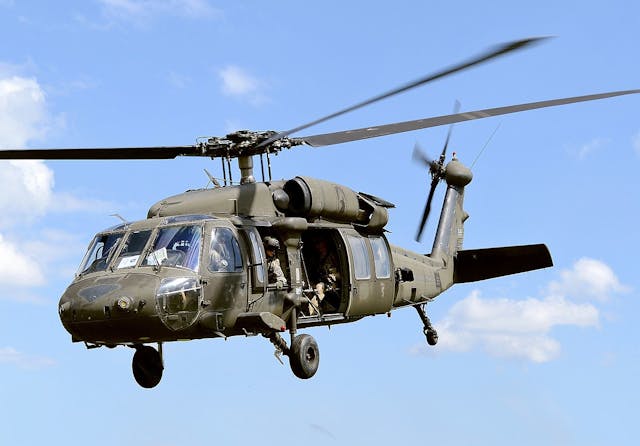Discover How the UH-60 Blackhawk Remains To Develop for Army and Rescue Workflow
Discover How the UH-60 Blackhawk Remains To Develop for Army and Rescue Workflow
Blog Article
Find Out About the Convenience of the UH-60 Blackhawk
The UH-60 Blackhawk is an impressive instance of modern-day military design, symbolizing flexibility across a large range of operational contexts. From army transport to clinical emptying and reconnaissance goals, its layout accommodates numerous duties while emphasizing fast release and adaptability. The sophisticated avionics and robust capabilities of the Blackhawk not just improve its operational performance in tough environments yet likewise prolong its energy in humanitarian initiatives. Comprehending its complex applications motivates a closer exam of how this helicopter remains to evolve and influence private and armed forces operations alike.
Background of the UH-60 Blackhawk
The UH-60 Blackhawk, a functional energy helicopter, was developed in the late 1970s by Sikorsky Aircraft to satisfy the U.S. Army's demand for a modern-day tactical transportation helicopter. This campaign occurred in reaction to the limitations observed in the previous generation of helicopters throughout the Vietnam War. The U.S. Military looked for an airplane that could do a series of objectives, consisting of army transport, medical discharge, and logistical support, while additionally showing improved survivability and performance.
The Blackhawk was designed with advanced innovation and engineering, featuring a twin-engine arrangement, a four-bladed rotor system, and a robust airframe. Its initial flight took place in 1974, and it was formally presented right into solution in 1979, quickly becoming a critical asset for the U.S. armed force. The helicopter's adaptability permitted it to be utilized in different battle and humanitarian procedures, showcasing its effectiveness in diverse environments and goals.
Over the decades, the UH-60 has undergone continuous upgrades and adjustments, ensuring its importance in contemporary war. Its legacy has solidified its status as a keystone of army aeronautics, reflecting a commitment to innovation and functional excellence.
Key Functions and Requirements
Regularly admired for its engineering prowess, the UH-60 Blackhawk flaunts a series of vital features and requirements that improve its functional capacities. This flexible helicopter is powered by two General Electric T700-GE-701C engines, each efficient in generating 1,800 shaft horsepower, allowing it to accomplish an optimum cruise ship speed of around 150 knots.
The airplane's unique layout includes a four-blade main rotor system and a four-blade tail blades, adding to exceptional ability to move and security. With a maximum takeoff weight of 22,000 extra pounds, the UH-60 can bring approximately 11 soldiers or equivalent freight. Its innovative avionics collection offers boosted situational recognition and navigating, important for different mission profiles.
The Blackhawk features a robust airframe built from innovative composite products, supplying raised toughness and resistance to tiny arms fire. UH-60 Blackhawk. Furthermore, the helicopter is geared up with a digital fly-by-wire control system, boosting responsiveness and decreasing pilot workload. With a variety of approximately 600 maritime miles and the ability to operate in diverse atmospheres, the UH-60 Blackhawk stays a crucial asset in modern-day army procedures
Military Applications
With its sophisticated features and specs, the UH-60 Blackhawk has become a cornerstone of army operations throughout the globe. Designed for adaptability, it fulfills a broad selection of roles varying from army transportation to medical emptying. The helicopter's ability to operate in diverse environments-- whether in battle zone or tough surfaces-- guarantees it remains an indispensable property for modern-day military forces.
The UH-60's durable design permits the transportation of approximately 11 troops, supporting quick deployment throughout critical goals. Its advanced avionics and navigating systems improve situational understanding, enabling pilots to perform complex operations also in adverse climate condition. Furthermore, the helicopter is furnished with protective systems to safeguard versus dangers, making sure the safety of personnel onboard.

Altruist Objectives

Altruistic goals usually depend on the UH-60 Blackhawk for its unparalleled adaptability and fast feedback abilities. This multi-role helicopter has shown very useful in various scenarios, helpful site including catastrophe alleviation, clinical emptyings, and logistics support in remote or unattainable locations - UH-60 Blackhawk. Its ability to transport supplies and personnel swiftly enables timely treatments throughout crises, substantially improving the effectiveness of altruistic procedures
The Blackhawk's innovative avionics and robust style allow it to run in difficult atmospheres, such as unfavorable weather condition problems or sturdy surfaces. Furnished with raising systems and clinical discharge abilities, the helicopter can obtain injured people from hard-to-reach locations, guaranteeing punctual medical interest. In addition, its capability to quickly deploy help materials, including food, water, and crucial devices, makes it a vital property in large-scale relief efforts.
Furthermore, the UH-60 Blackhawk's versatility permits numerous configurations tailored to particular objective needs, whether it includes moving emergency -responders or providing essential sources to afflicted populaces. Its operational background in altruistic missions emphasizes the airplane's crucial function in alleviating and conserving lives suffering throughout humanitarian dilemmas and all-natural disasters, showcasing its withstanding commitment to sustaining worldwide relief initiatives.
Future of the Blackhawk
The future of the UH-60 Blackhawk appears encouraging as advancements in modern technology and progressing mission demands shape its ongoing relevance in army and private operations. As militaries around the globe look for to modernize their fleets, the Blackhawk is undertaking upgrades that enhance its capacities, including boosted avionics, advanced interaction systems, and boosted haul capacities.
The integration of unmanned systems and expert system is poised to reinvent procedures. Future variants may integrate autonomous trip abilities, allowing for enhanced operational versatility and minimized threat to employees throughout high-threat missions. Additionally, hybrid-electric propulsion systems are next being discovered to boost gas effectiveness and reduce the ecological impact of army operations.
International partnerships and export opportunities are likewise increasing the Blackhawk's worldwide impact. As countries invest in improving their air mobility abilities, the Blackhawk's adaptability makes it a positive choice for various functions, from army transport to clinical evacuation and search-and-rescue procedures.
Final Thought
The UH-60 Blackhawk exhibits convenience in armed forces aviation, properly satisfying functions ranging from troop transportation to clinical evacuation and reconnaissance. As functional needs advance, the continued advancement and integration of the Blackhawk will guarantee its importance and efficiency in dealing with future obstacles in both private and army contexts.

With its innovative attributes and specs, the UH-60 Blackhawk has become a keystone of military operations throughout the globe. As armed forces techniques progress, the UH-60 Blackhawk proceeds to play a crucial duty in improving operational performance and guaranteeing objective success throughout the movie theaters of engagement.
Humanitarian goals typically count on the UH-60 Blackhawk for its exceptional convenience and fast response capacities. UH-60 Blackhawk.The UH-60 Blackhawk exemplifies convenience in military aviation, successfully meeting duties varying from read here army transportation to medical discharge and reconnaissance
Report this page